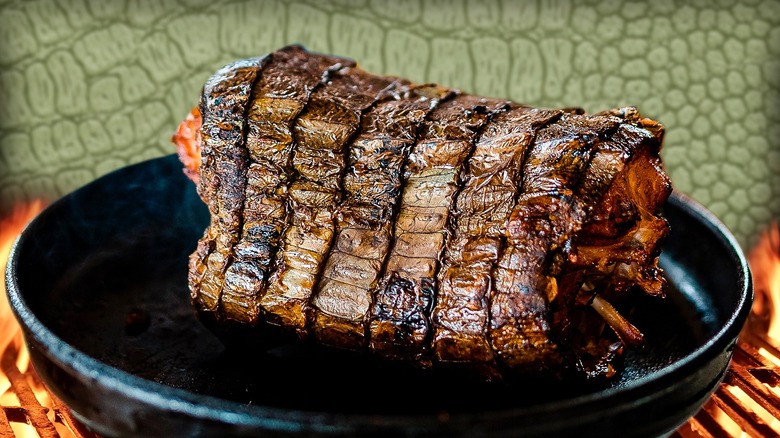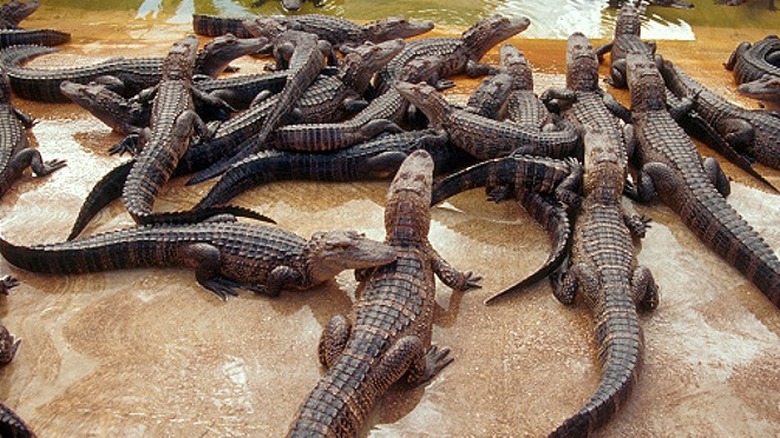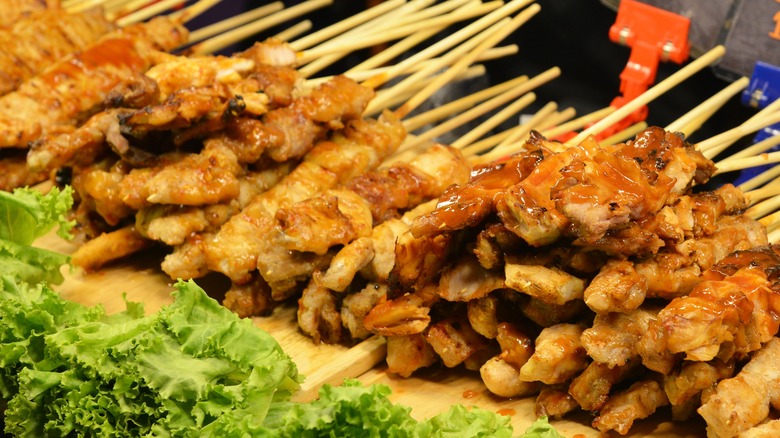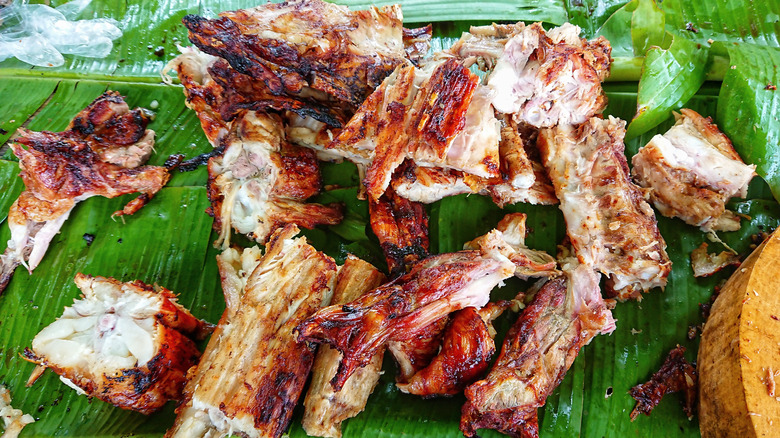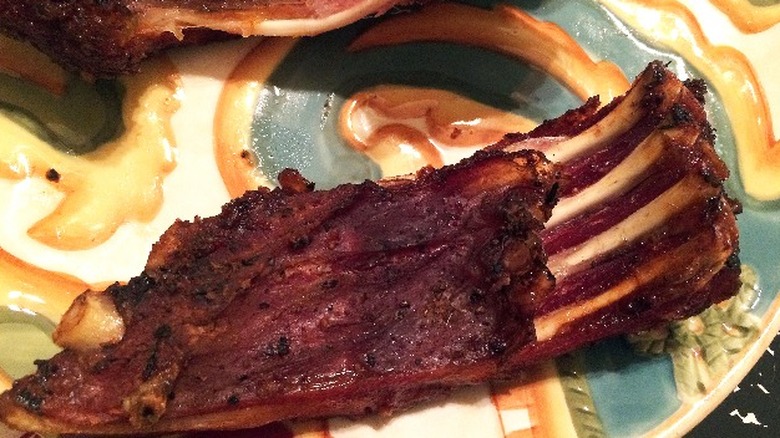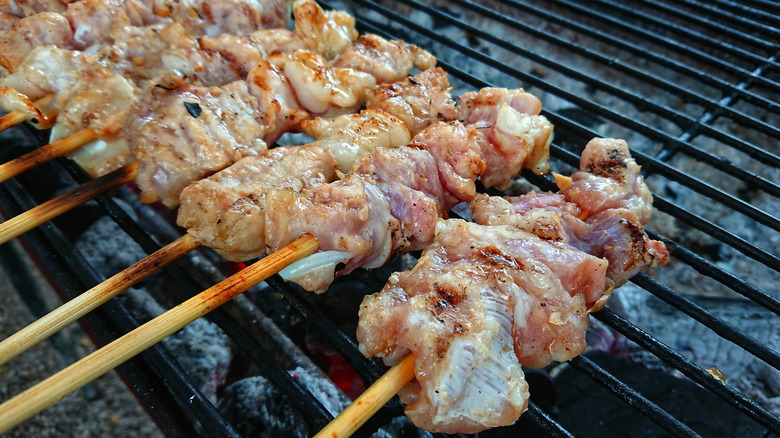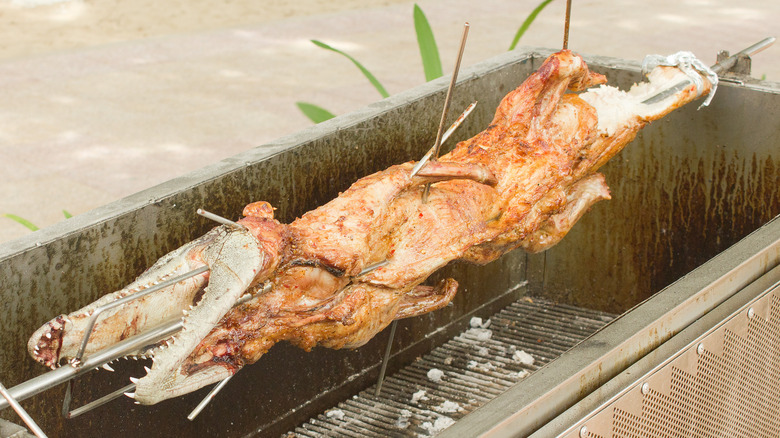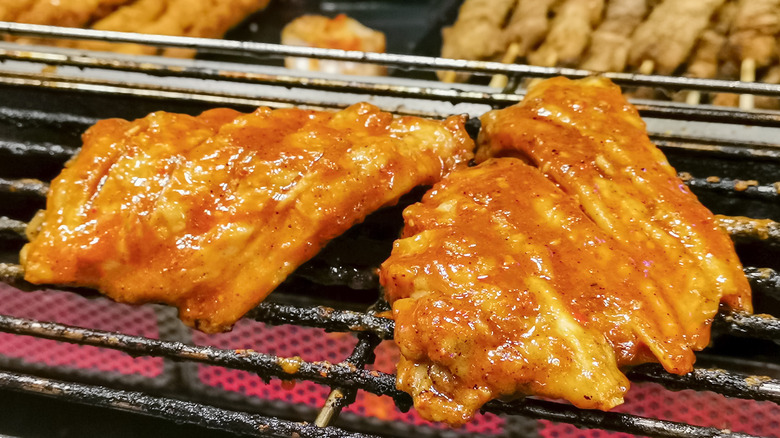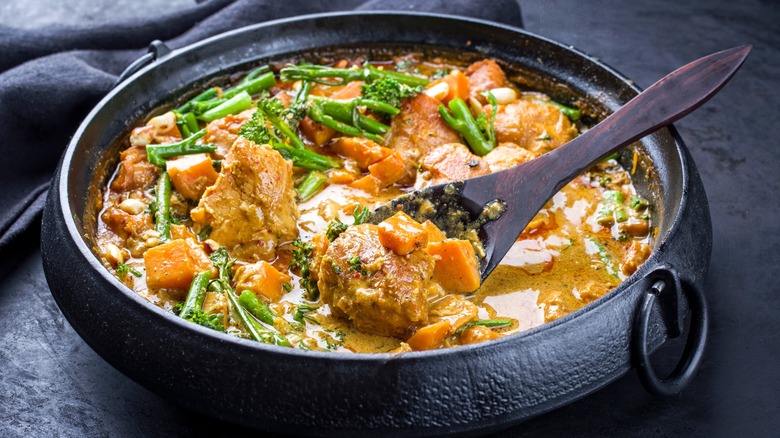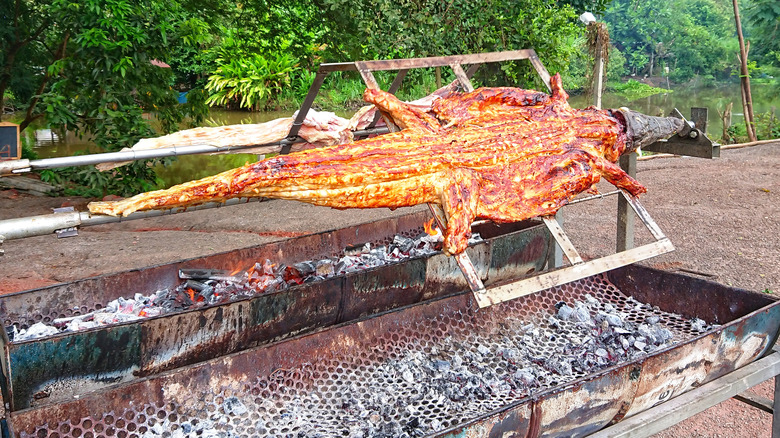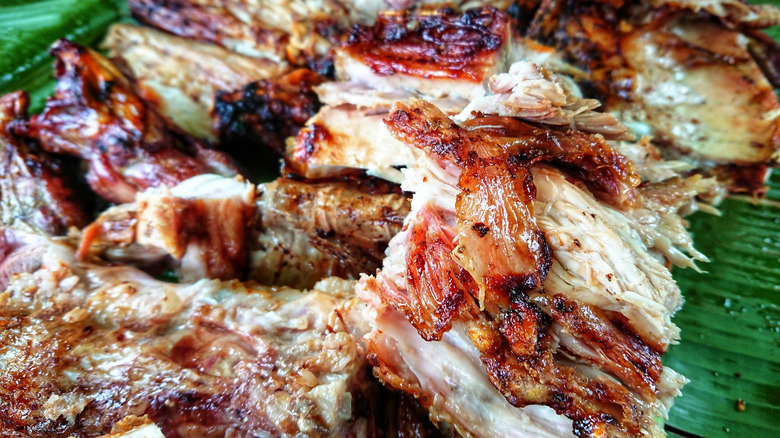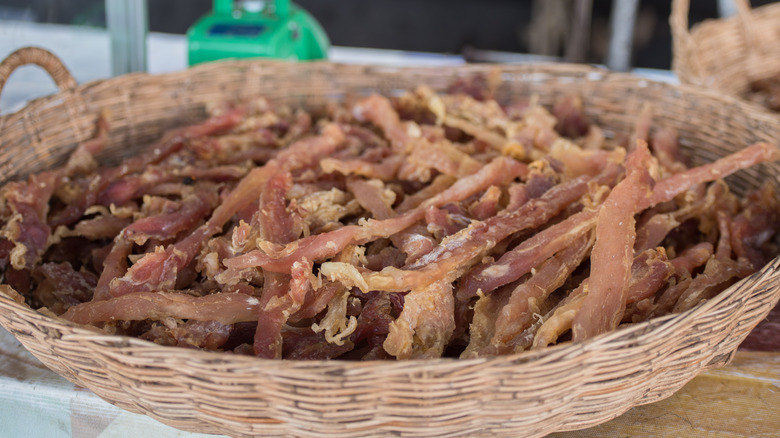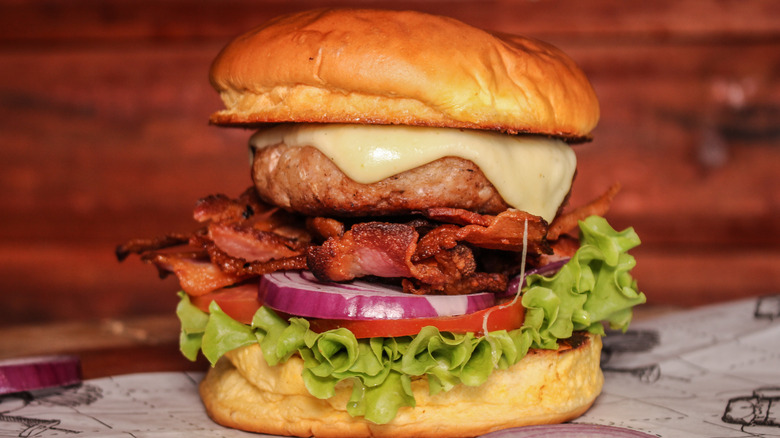12 Helpful Tips For Perfectly Grilled Alligator Meat
In the South, alligator meat is a must-have — and if you've never tried it before, you're missing out. With a taste that's compared to a cross between poultry, pork, and fish, gator meat is versatile and included on many restaurant menus. If you have sampled an alligator dish and didn't like it, chances are that the meat wasn't sourced or cooked in the best way.
Whether you're new to Southern cuisine or have previously chowed down on fried gator at a tailgate party, what you need to know about alligator meat is that it's lean, protein-packed, and sustainable. To learn more about what could be called "chicken of the bayou," we reached out to alligator experts to round up the most helpful tips for perfectly grilled alligator meat.
Straight from the Florida Everglades, we spoke with Tyler Riechman, the vice president of Alligators, Inc. — a "one-stop shop for all things alligator" — to get the scoop on everything from sourcing gator meat to finding the best alligator recipes to enjoy. We also checked in with Christie Vanover, the head cook and championship-winning pitmaster with Girls Can Grill, and Mike Starr, owner and operator of Blazing Star BBQ, to learn all about grilling and smoking alligator meat, from prep to finish.
1. Source alligator meat from a reputable farmer
Alligator meat isn't something you're likely to casually find when cruising your local grocery store, especially if you don't live in the South. You're better off ordering it from a specialty meat provider — unless you're prepared for a swampland safari. "There are several ways to source alligator meat, whether you apply for tags and hunt it yourself, buy it from a farm or processing facility, or even a big box store," Tyler Riechman tells us.
But if you want to get the best quality possible, it matters where alligator meat comes from, which is why going directly to a farmer is better than taking a chance on what you might find while grocery shopping. "One issue is that you don't know what you're getting," Riechman explains. "When you buy it from a chain or big box store, they are sourcing meat from anywhere, for quantity not quality."
When you source directly from an alligator farm that processes the meat, the business is in control of everything from beginning to end, thus providing the consumer with the best products. Alternatively, Christie Vanover suggests looking for a specialty butcher who has a wide variety of meat-producer contacts, and can obtain gator meat from a reputable source. If your gator meat comes frozen, thaw it fully before brining, marinating, or grilling.
2. Separate white meat from dark meat before grilling
Like most animal-based protein, gator meat can be classified as either white or dark. And similarly to more common meats, there's enough of a difference between the white and dark cuts to warrant separating the two before grilling. In order to properly cook your gator meat, you want to know which part of the gator you're working with. Just as you would cook various cuts of beef and poultry differently, so too should you cook white and dark gator meat differently.
White alligator meat that is sourced from the tail is commonly sold to consumers, and this is a part of the gator that you'll typically find deep-fried. Tyler Riechman warns that the dark meat doesn't fry well, although that doesn't stop some eateries from serving it. "If you ever ate alligator at a restaurant and had a very good piece, then a really chewy piece, it's because their supplier doesn't separate the different meat," Riechman says.
If you're sourcing your gator whole and want to get adventurous with butchering it yourself, Christie Vanover recommends watching YouTube videos on the butchering process. Mike Starr adds, "Gators sold whole typically come skinned and gutted, leaving only the skin on the head and feet intact. You want to remove the fat and sinew (tendons and vessels), because they don't render down and are not pleasurable to eat."
3. Opt to grill tail meat if you're a beginner
For gator-grilling beginners, Christie Vanover suggests starting with tail meat before attempting to barbecue other alligator cuts. (If you're new to barbecuing altogether, make sure to learn some essential tips and tricks for grilling before taking on a slab of alligator meat.) Tail is generally the preferred cut of gator, as it's the most tender, and it grills up quickly and easily. Vanover recommends keeping it simple. "I like to cut the meat into chunks and then season them. I slide the seasoned nuggets onto skewers, and grill them over high heat for about five minutes per side," she says.
When you're shopping for tail meat, keep in mind that the best part you can buy is called tenderloin, and this is cut from the inner portion of the tail with an appearance similar to pork loin. Mike Starr tells us that good tail meat can be found on alligators of any size, which is another reason why it is one of the most widely sold cuts. Other gator chops — such as back strap and ribs — typically come only from large gators, and this meat can be a bit tougher.
4. Tailor your grilling method to each individual cut
After you've mastered the art of grilling alligator tail meat, try your hand at some of the other cuts available, such as back strap fillets, jowls, ribs, and front legs (aka alligator wings). Similarly to learning about other cuts of meat that are best for grilling, understanding the various parts of the gator can help you grill it correctly and avoid ending up with tough, chewy meat.
Skewering an entire gator on a spit and roasting it whole over an open fire would certainly create a barbecue-party conversation piece, but Mike Starr recommends against this. "It is best to break them down into individual pieces instead of cooking them whole," he says. "Of course, it looks cooler to cook whole, but you will get the best results when cooking the individual cuts of meat separately."
Starr guides us through the details. For instance, gator legs are considered dark meat, and taste best when cooked like chicken wings, since the legs are tougher than the tail. Likewise, gator ribs grill well when prepared similarly to pork ribs. "Ribs and wings I would grill differently than the tail and back strap," Starr says. "I like to cook [ribs and wings] more indirectly on the grill a little longer to help break down the meat. The tail and back strap I would grill more over direct coals, hot and fast, making sure not to overcook or it will dry out."
5. Soak gator cuts for at least an hour before grilling
Though many folks agree that alligator tastes like chicken crossed with fish, some people find that gator meat tastes too fishy. If you're familiar with the culinary world of exotic proteins and their savory profiles, gator meat is also said to have a flavor similar to frog, though not as strong as turtle meat. A helpful tip to combat unwanted swampy flavor notes in your gator meat is to soak cuts in buttermilk for at least an hour, and preferably longer, according to Tyler Riechman.
If you don't happen to have buttermilk on hand, you can marinate gator meat in acidic lemon juice or vinegar, while regular whole milk can also emulate the same effect that buttermilk produces. Aside from milk, you can also use evaporated milk to tenderize meat. Lactic acid in the milk helps break down and neutralize the protein in alligator meat.
Feel free to experiment with other ingredients, such as herbs or hot peppers, to enhance your marinade and give the gator meat additional seasoning. And if you don't have any type of milk in your fridge, try full-fat yogurt instead.
6. Brine whole alligators for hours before grilling
If you choose to cook the entire alligator, it will benefit from extended brining to help produce the most tender and juicy gator meat possible. Tyler Riechman suggests brining the whole alligator for at least a few hours, but preferably overnight.
Christie Vanover agrees with Riechman. "If cooking a whole alligator, soaking it in a wet brine for 12 to 24 hours will help impart more flavor into the meat and ensure juiciness," she says. "Alligator meat takes on the flavors of rubs and brines very well."
Where and how you brine a whole alligator depends on the size of the gator you've sourced. If you purchase a 7-foot gator, you may be eyeing your bathtub to perform the task. But it's more than likely that whole gators sold by specialty suppliers will be somewhere between 4 to 6 feet in length, packaged in a curled position, and able to fit in a large cooler filled with brine. Unless you have gallons of buttermilk at your disposal, consider using water for your liquid brining base — but play around with various seasonings to add flavor to your gator, and check out the best types of salt to use for wet brining.
7. Season alligator meat in a variety of styles
Alligator meat is a mild-tasting protein — like chicken, white fish, or shellfish — and benefits from adding seasoning before grilling. The seasoning should be added after brining, but you can certainly include spices and herbs in your brine. Just make sure that you keep the spices and herbs consistent during every step of preparations, so that your final gator dish has a cohesive flavor profile. As Christie Vanover points out, because gator meat is mild, "it takes on seasonings and sauces well."
Tyler Riechman concurs, noting that options abound for gator-meat seasoning techniques. "There are tons of ways of adding your flavorings to the whole alligators before cooking, from coating in liquid sauces, dry rubs, injection, and spray spritzing," Riechman says. Among the various styles of regional BBQ in the U.S., you can choose Cajun, Texas, or Carolina seasonings, to name a few.
Mike Starr tells us that gator is frequently seasoned with something spicy to help mask any fishiness in the meat. When smoking gator, he usually uses Blazing Star Reaper Seasoning — featuring Carolina reaper chili pepper — while he relies on a more versatile All in One Seasoning for frying or searing alligator tail or back strap fillets.
8. Consider your recipe when grilling gator meat
When you're prepping the gator for grilling, consider the recipe you want to use and how it will work with alligator meat. Tyler Riechman describes gator meat's flavor and consistency as "a cross between chicken, pork, and fish. It's a white meat like chicken, texture similar to pork, but a flakiness of fish without the fishy taste."
Since gator meat is a mild protein, it's easy enough to use it in recipes similarly to how you'd cook poultry or pork. Consider these attributes when substituting grilled alligator into your dishes. This will not only help you decide the best cut and seasonings to choose, but also help you determine how to grill it properly.
Of course, you can enjoy the simplicity of grilled gator as a stand-alone option on your plate, but you can also broaden your meal by adding grilled gator to a number of recipes, such as sausage and seafood gumbo or traditional jambalaya. Christie Vanover shares her favorite way to enjoy gator: "Personally, I love Cajun flavors with alligator meat, which basically include salt, pepper, garlic, and chilies. And I really love serving it with a Mississippi comeback sauce, which is kind of like a spicy Thousand Island."
9. Smoke whole alligator for best results
Although you can grill gator cuts with direct or indirect heat, when cooking a whole gator, it will turn out more tender and tastier when smoked, according to Tyler Riechman. If it's done correctly, it will also feature a nice bark. He shares his favorite way to enjoy gator, which entails using either oak or hickory when smoking: "My favorite way to grill a whole alligator is to brine overnight, pat dry, and smother Meat Church's honey bacon bbq season all over it, then wrap in pepper-seasoned bacon, and about every 45 minutes to an hour, spritz with apple cider." Sounds like a winning combination.
On the flip side, Mike Starr believes that covering alligator meat in bacon will overpower its subtle taste, and that it will be more delicious if the gator was brined properly. "Brine the gator overnight in a cooler to take away the fishy taste and help make it juicer, since it is a very lean meat. I also spritz with water or other liquid mixtures every 30 minutes to help prevent it from drying out," he says, adding that the types of wood you use for smoking and grilling can impart complementary flavor to the gator. "I like to use milder woods, like fruit woods or pecan wood, for smoking gator."
10. Use a meat thermometer to tell when gator is ready
A common issue with grilling alligator is that it can quickly dry out. Both Tyler Riechman and Mike Starr warn that overcooked alligator meat can be tough, and end up with a leathery consistency. This is a common reason why some folks claim to dislike gator meat — what they tried was cooked past the point of being edible. Just like with any other type of meat, you will get the best results if you use a meat thermometer to determine when your gator is done cooking.
When is alligator meat done cooking? It depends on your preferences. You can enjoy gator meat anywhere from medium rare to medium. Individual cuts of gator are often grilled over high heat, such as 350 F to 400 F, while an entire gator is best cooked over low heat, from 225 F to 275 F, according to Starr.
However, this brings into question how to test the doneness of a whole gator, given its varying thickness from nose to tail. Riechman lets us in on that secret: "When smoking or grilling I go for about 158 F to 160 F internal in the biggest part of the tail for whole alligators. Above that, the thinner parts of the alligator become too dry for me." In this preparation style, Starr prefers a slightly lower internal temperature of 145 F; otherwise he feels that the meat dries out too much, due to its being quite lean.
11. Try making gator jerky
Similarly to how you can turn your charcoal grill into a smoker, you can transform a pellet grill into a dehydrator. Dehydrating meat requires a fairly low level of heat. You'll need to get the temperature of your pellet grill down to about 160 F to 175 F for dehydrating. The other component necessary for drying meat is to cut it into thin slices. If you're sourcing gator meat from a butcher or specialized processor, you may be able to request thinly sliced gator meat. Otherwise, use your best knife and do it yourself.
Since most meats can be made into jerky, Christie Vanover walks us through how to do so with gator. "Simply slice the tail meat very thinly and marinate overnight. You can use a teriyaki sauce or a Cajun marinade," she says. "Then, pat the pieces dry and smoke them at around 180 degrees [Fahrenheit], until the slices are firm." And there you have it — gator jerky can be a great protein-packed snack or meal substitute.
12. Get creative when grilling alligator meat
With the high palatability of alligator meat, don't be afraid to get creative with your gator recipes or dishes. While you might introduce your taste buds to gator meat with simple kebabs or smoked chunks, the possibilities are practically endless thanks to the meat's mild blank canvas of a taste. Aside from tossing grilled gator tail into your next Southern stew or enjoying a fillet of it on a bed of dirty rice, consider other not-so-common options like ground gator burgers, gator hot dogs, or alligator smoked sausages — some of which you might find at authentic New Orleans restaurants.
If you're unable to purchase ground alligator, Christie Vanover suggests grinding it yourself and using it in any recipe that calls for ground meat (especially as a substitute for ground chicken). And if you happen to be butchering an entire gator yourself, choose the dark meat for grinding.
However, because gator is so lean, it can be enhanced with added fat, like bacon or pork belly. Consider blending such fats into the ground gator meat for burgers or sausages. Alternatively, choose a side dish that provides some heft. All three of our gator experts recommend mac and cheese as a side dish for alligator entrées, along with other creamy sides like potato salad or coleslaw.
